More actions
No edit summary |
|||
| (39 intermediate revisions by 5 users not shown) | |||
| Line 1: | Line 1: | ||
{{Info knights | {{Info knights | ||
|image = | |image = Bloodknight.png | ||
|pronunciation = Blood-cast | |pronunciation = Blood-cast | ||
|origins = [[City of Regalia]] | |origins = [[City of Regalia]] | ||
|grandmaster = | |grandmaster = Richard Durwallis | ||
|colors = Black and Crimson Red | |colors = Black and Crimson Red | ||
|}} | |}} | ||
The Bloodcast Order is the | The Bloodcast Order is an Order forged in the betrayal of another. When five dissenting [[Viridian Order | Viridians]] charged across the Imperial bridge to warn the Emperor of the betrayal of the Viridian Order to stage a Coup, their cloaks were soaked in the blood of their former brothers. As they kneeled to warn the Emperor of their former brothers, they rose as Bloodcast, having rejected the Code of Chivalry, and donned their own moral Code against what they saw as the corruption that power brings. While the Bloodcast are still [[Knights]], their Order is considered the closest approximation of a Hedge Knight with far looser restrictions than the other Knight Orders. In fact, to a degree, Bloodcast Knights are considered the anti-Knights that not only keep other Knights in check from abusing their powers, but more widely also the Nobility and other systems of power. While other Knight Orders claim to protect the common folk, this often is purely virtue signaling as window dressing for their ideology. Only the Bloodcast are the true defenders of the common folk. | ||
==Design== | |||
Bloodcast Knights follow in much the same vein as Viridians, in that they appear like typical medieval feudal knights, and are honor-bound state enforcers, but their reliance is less on chivalric behavior, and more on pragmatic individualism. They are often brash, speak frank and crude, and are boisterous and loud, seeking confrontation with the Viridians both for historical and ideological reasons. The following design limitations are enforced on the Bloodcast: | |||
* Bloodcast should predominantly use melee weapons with heavy armor. This means they can use sidearms of a different nature, but when a Knight stops looking like a medieval Knight, that is not good for general theming. There are however, some exceptions: | |||
** The Forneik Chapter also allows light armor, with many of them frequently using more light weight materials. | |||
** The Basileon Chapter also allows light armor, and no armor at all, as the traditional gladiator outfit has little cover. | |||
** The Vanatori Chapter allows the use of ranged weapons and light armor as their primary fighting style, including firearms. | |||
** The Slavnostni Chapter allows the use of small weapons like daggers and arming swords, as well as light armor and tech implements. | |||
* Widely speaking the Bloodcast Order does permit Magic usage in utility and supporting roles to combat. Some exceptions apply: | |||
** The Steelmark Chapter bans Magic usage, and is highly critical and outright purist chauvinistic of other Bloodcast using Magic. | |||
** The Basileon Chapter bans Magic usage in Duels, Arenas, and Gladiatorial fights, but allows Magic in other Bloodcast Business. | |||
** The Blucherwald Chapter does allow Magic, but there is controversy in using it, due to their need to appeal broadly to all of society. | |||
* Bloodcast Knights can use Horses, but mostly avoid it for optical reasons, since horses are vehicles for the wealthy. | |||
* Bloodcast if they are Noble must renounce their title/inheritance/family name. They also cannot romance Nobles. | |||
** Bloodcast cannot be seen to work, socialize, fraternize, or otherwise associate with Nobles in any way. The only exception is the Steelmark, who are allowed to take Mercenary contracts from Nobles, but only if the contract specifically involves attacking another Noble. For them to take a Contract from a noble that targets anything else than a Noble is a violation of Code. | |||
* Bloodcast cannot be Undead, Vampires, Automata, Homunculi, Demons, or Marken. | |||
* All Bloodcast must wear some aspect of red, even if it is just a cape or sash, to identify their loose allegiance. | |||
==Chapters== | |||
All Bloodcast Knights are members of one single Chapter, which grants them a free non-Combat related Mechanic. Changing Chapters is permitted but only infrequently and only through a Staff Ticket where the request is reviewed. | |||
===Blücherwald=== | |||
[[File:Capecapenewbloodcastgfuys.png|150px|caption|right]] | |||
The Blücherwald Chapter is the founding chapter of the Bloodcast Order, established in the wake of the Viridian Coup by the five Knights who foiled the plot against the Empire. While initially copying the Viridian model, the Blücherwald Knights eventually abandoned the rigid structure in favor of roaming the countryside to assist anyone in need. As such, the Blücherwald Knights are seen as the model Hedge Knights among all the Bloodcast Chapters, often seen as the anchor that holds their various ideologies together. They primarily wield swords and shields while donning worn armor from their many travels, and may also utilize horses for the purposes of transportation, as fighting from them is seen as pretentious. Blücherwald Knights are one of the strongest advocates for the common citizen, and are the most vigilant in holding higher powers accountable for their actions. | |||
{| | |||
|- | |||
| style="padding: 10px" | '''Assembly<BR> Voice''' | |||
| | |||
If you are not already sitting in the 1st or 2nd Estate benches in the Assembly, you are a privileged member of the 3rd Estate benches. While you do not get a vote, you are allowed to debate with the other Assembly members as if you were a full fledged member of the Assembly. | |||
|- | |||
|} | |||
===Basileon=== | |||
[[File:Traionbanner.png|150px|caption|right]] | |||
The Basileon Chapter is one of the earliest chapters to join the Bloodcast Order from its native Aetosian homeland of Etosil. The Basileon Chapter is often recognized by their traditional (corinthian) helmets, or (roman) gladiatorial helmets. The Basileon Chapter is obsessed with proving and testing military strength, it is an immensely popular Chapter with Ailor, Eronidas, and Maquixtl, who seek out glory and fierce combat in the arena to prove their mettle against other Knights, and outsiders. Basileon Chapter members are frequently also gladiators for hire who sell out their service in the ring to bring prestige and honor to Noble houses or anyone who can afford their service. Basileon Knights also frequently act as physical trainers, drill instructors, and general military practice teachers, due to their length of service. They primarily wield melee weapons though tridents are sometimes also used, as they can be found frequenting regalian coliseums. | |||
{| | |||
|- | |||
| style="padding: 10px" | '''Greater<BR> Strength''' | |||
| | |||
You are stronger than the average normal person when it comes to out-of-combat tests of strength. Whether it is in arm wrestling or other power competitions, you can always re-roll once, choosing the highest number. You can also carry much heavier loads than other normal people. | |||
|- | |||
|} | |||
===Thousandblade=== | |||
[[File:Untitrrled Artwork.png|150px|caption|right]] | |||
The Thousandblade Chapter is a relative latecomer to the Bloodcast Order, as it once prided itself in being isolationist in Anglia. The Thousandblade Chapterhouse can be found in Axford, Anglia, which is a monastery surrounded by a wall of rusting swords, planted into the ground for each Knight who retired to the monastery, or Kade Family Member who retreated from public life. Since recent decades, the Order has re-militarized, and recruited new members started actively protecting Temples and particularly Dragon Sites on the personal Orders of House Kade. The Thousandblade Order contains both Draconism and Unionism worshipers, who marry many of their ideological stances to preserve life, but also to protect Dragon Sites and Religious Freedom in the Empire as a memory to Dragons. Thousandblade Knights can be distantly related Cadet branch family members of House Kade, consult in Staff Ticket what this means and how to design it. | |||
{| | |||
|- | |||
| style="padding: 10px" | '''Princely<BR> Herald''' | |||
| | |||
You can write [[Commendation Letters|Letters of Commendation]] even if you are not a Noble, and your letters of Commendation have a much higher value than the average Noble or government person. Additionally you can request a personal 1 on 1 meeting with a member of the Royal Family at the Palace with a reason presented (in a Ticket). Also, you can wear armor and weapons at the Imperial Palace and Assembly, and guard for Events held there. | |||
|- | |||
|} | |||
== | ===Vânători=== | ||
The Bloodcast | [[File:Untssitled Artwork.png|150px|caption|right]] | ||
The Vânători Chapter joined up with the Bloodcast fairly early, but was always more interested in the use of ranged weapons. They were the first chapter besides the obvious Darkwald Lothar, who have widely adopted firearms training in their repetoire. The Vânători Knights primarily concern themselves with protecting the people against all manner of brigands, thieves, and pirates. They are sometimes also called Nautknights, because many of them actually fight as marine-style Knights on the decks of ships as they board pirate vessels. Vânători Knights specifically chase after thieves and burglars, seeking to return stolen property to their righteous owners (or who has paid them most). This means they sometimes get involved in fights over valuable objects or Artifacts which have a habit of quickly changing hands, deciding who the righteous owner should be and then making it happen. The Vânători Chapterhouse is in the Vlach lands in Allachia, Baldmark. | |||
{| | |||
|- | |||
| style="padding: 10px" | '''Greased<BR> Palms''' | |||
| | |||
You can make trades of resources (Divinium, Artifactsparks and Wealth Tokens) non-publicly, or can facilitate a trade between two people to make it non-public, done through a ticket rather than through public channels. | |||
|- | |||
|} | |||
===Steelmark=== | |||
[[File:Steelmarks.png|150px|caption|right]] | |||
The Steelmark Chapter is a split-off from the infamous Blackmark Knights, who joined up forces with the Iron Duke of Vultaro, and essentially became a private military Mercenary Band. The Steelmark Chapter split off from that Order, refusing to work with the Iron Duke, or simply refusing to be chained down to a single liege-lord. It was induced into the Bloodcast Order fairly quickly, some also say with a modicum of threatening from their part. Steelmark Knights are brutish, large, and wear the intimidating blacksteel plate armor, while using large tower shields or other massive shields that are as big as themselves. They have a reputation of being cruel in combat and crass in a social setting, frequently the ire of Viridians as they barely hold onto the formal Internal Knight Code. Steelmark Knights act as part Knight, part Mercenary, promising to do the basic minimum of being a Bloodcast, so they get to benefit from the Solvaan Mercenary Law exception. | |||
=== | {| | ||
|- | |||
| style="padding: 10px" | '''Mercenary<BR> Sanction''' | |||
| | |||
When it concerns Mercenary work in line with the [[Regalian_Civil_Code#Solvaan_Mercenary_Exception|Solvaan Mercenary Exception]], you count as being Solvaan, even if you are not, meaning you cannot be persecuted for doing Mercenary work as defined in this Law. | |||
|- | |||
|} | |||
===Forneik=== | |||
[[File:Oldoakbanner.png|150px|caption|right]] | |||
The Forneik Chapter, sometimes also called Great Oak Chapter, is a Chapter dominated by beast and monster hunters who compile a compendium of monsters, and how to best hunt them down. The Empire is filled with all manner of mutated beast, wild animals, and the Afflicted and Marken, and the Forneik Chapter brings the answer. Their Chapterhouse is based in Kerulv in Drixagh, the Regalian Archipelago, and is built inside a massive grand oak tree that is hundreds of years old. The Forneik Chapter has many Fornoss faithful or Velheim members, but also recruits outside of the Empire, even Sihndar, who bring valuable information on corrupted monsters that escape Drowda. Forneik Knights frequently fight with roundshields and axes, adopting many Skagger techniques through a lively cooperation with local Velheim clans. Forneik members tend to be more stoic and less talkative than the other Chapters, constantly on the lookout for an ambush. Notably, while Bloodcasts tend to allow Affinites, the Forneik Chapter specifically does not allow its members to have any sort of "monster" transformations, and if discovered, will expel and hunt them down for betraying the mission. | |||
= | {| | ||
|- | |||
| style="padding: 10px" | '''Greater<BR> Hunter''' | |||
| | |||
You are an apex hunter in the wilds, capable of a greater sense of the hunt, sight, and hearing in nature. You can effortlessly capture mundane animals in the hunt and may receive additional benefits during Monster Hunt Events or Monster encounters in the forests of Regalia. | |||
|- | |||
|} | |||
===Slavnostní=== | |||
[[File:Happyknights.png|150px|caption|right]] | |||
=== | The Slavnostní Chapter is a highly unusual Chapter of Knights that both uses unusual combat techniques (Roguery and/or Technology), but also in the sense that they will try to avoid combat as much as possible. Slavnostní Knights hail from the Chapter house Poslední smích in the city of Praag. Although it was once predominantly Zeměvčel in culture, many other peoples of Aloria and cultures have joined to make the people of the Empire merrier and raise morale. That is exactly what the Slavnostní Knights do, hosting parties, getting horrendously drunk, and doing stand up comedy routines to try and ease the trauma, pain, and bad memories of the people and giving them happy days and happy thoughts. Slavnostní Knights also attempt to fight as comedically as possible, to create a spectacle even when they are forced into a fight for onlookers, and generally try to take life as simply and guilt-free as possible and facing each day with a new smile. | ||
The | |||
= | {| | ||
|- | |||
| style="padding: 10px" | '''Social<BR> Beast''' | |||
| | |||
You have an impossibly high tolerance for Alcohol, drinking anyone under the table, and able to make cups or glasses magically refill themselves with the God's ale. You are immune to being arrested for Low Law violations, so long as what you have done isn't annoying or cringe-inducing for the Knights to deal with. Benign crime receives just a slap on the wrist and an "oh you" from Knights. | |||
|- | |||
|} | |||
==Internal Bloodcast Code== | |||
The Internal Bloodcast Code contains additional Honor and Behavior Codes for Bloodcast Knights that are supplemental to the Common Code described on the Knights Page. | |||
# Bloodcast Knights are expected to turn the cheek if a Noble is in trouble (unless in mortal danger), and specifically assist the common folk, especially if they are being abused by the Nobles and the Rich. | |||
# Bloodcast Knights must seek justice for the common folk when the system and authorities fail them or stonewall them, even if this means breaking the law on occasion. | |||
# Bloodcast Knights must reject working with Viridian Knights except for religious reasons (Temple Raids) or to fight a common threat against the Regalian Empire. | |||
# Bloodcast Knights must hold the powers that be accountable, whether secular, religious, or in other Knight Orders, and hold an Accountability Forum to inform the people. | |||
== | ==Bloodcast Jobs== | ||
The Bloodcast | * '''Accountability Forum:''' The Accountability Forum, is one of the levers that Bloodcast have to hold people of power accountable for their abuse of power. An Accountability Forum, is a publicly hosted Event where one or more Bloodcast take to a soap box or forum to proclaim a public debate on the abuse of power of an individual. A Bloodcast can at any point in time call an Accountability Forum by pinning a Server Event to a specific date and time. There, they are expected to make an appeal to the crowd, make their points, and hear out the crowd's supporting or refuting stances. The point is to convince the crowd to agree to a protest against the targeted individual. The targeted individual does not need to be there, but they can show up, and would be allowed to defend themselves for public review. Accountability Forums have no legal basis, they are purely mob justice through debate verdict. | ||
* '''Slum Outreach:''' Slum Outreach is a more passive engagement of the Bloodcast, where they either seek to establish social connections with the downtrodden and forgotten, or specifically roam around Crookback and maybe even the Sewers with the intent of peacefully talking to the locals and discovering their woes and qualms with city goers. Most citizens do not report abuse of power, so the Bloodcasts believe that mingling with the places where this is most acutely felt is the best way to figure out if someone in power is actually abusing anyone. | |||
* '''Public Scrutiny:''' Another method of holding powers to account, is Public Scrutiny, which in actually occurs more in private. Bloodcast Knights should constantly be aware of who is in government and what their expectations are. If a government official is slacking, or not fulfilling their job by expectation, Bloodcast are meant to request meetings with them to question their dedication to their position, and encourage resignation if they do not improve their work ethic and discipline, or face an Accountability Forum. Government individuals are meant to feel scrutinized by the Bloodcasts. | |||
* '''Power Separation:''' Bloodcast, as the only Order with 0 involvement in Noble politics and 0 Noble influence in their work, must continually be aware of Noble encroachment on the other Knight Orders. They are expected to pay exceptionally close attention to Nobles who are members of Knight Orders, and how that membership influences the attempt of their family to influence Order politics, or vice versa. Bloodcast Knights believe in true separation, and if a Noble House is found guilty of trying to steer a Knightly Order into their political benefit or starts corrupting their Order Code, Bloodcast are expected to sound all alarm bells very publicly. | |||
* '''Protest Guard:''' The right to protest in Regalia is not a civil right, meaning that protestors usually get arrested. One exception is a protest which is guided by Bloodcast Knights, in which the Knights stand responsible for the good conduct of the Protest. A Protest involves a group of people standing strategically in a specific location like the front door of a Noble Estate, in front of the Golden Willow, or blocking the entryway of the All Beacon Temple or some other building where-in a person they are protesting resides. The Knights must ensure that the protest does not turn violent and that slogans and speeches are acceptable within the norms of the Court and Emperor's respect. Finally, they must also protect the protest from any counter-protest violence. Protests are encouraged to be pinned as server Events. | |||
==History== | ==History== | ||
Bloodcast Order history is surprisingly simple, and concise. The order officially started in 122 AC, during the Viridian Coup | Bloodcast Order history is surprisingly simple, and concise. The order officially started in 122 AC, during the [[Viridian Coup Attempt]]. Five Viridian Knights defied the other Viridian Knights who intended to imprison Emperor [[Henri III]] and usurp the throne, by riding to the Emperor and warning him. On their way to the castle, the five Knights were attacked by their fellow brothers in arms, but were victorious and rode on to the Palace to warn the Emperor, which would eventually lead to the rounding up and execution of the Viridian Knights who plotted treason. The five Knights, after having been attacked and riding to the Emperor, rode with their usual green capes covered in blood, hence becoming red. They then swore an oath to do better than what the Viridians had, and Emperor Henri III gave them the rights to found a new Knighthood Chapter, ostensibly to compete with the Viridians who were already severely reduced in power, but also to cover the blind spots the Viridians could not in society. Those five ex-Viridians thus founded the Bloodcast Order, became its first teachers and Elder Council, and lead the order until the last of them, Councilmaster Henry of Benteford, died in 167 AC. The Order's history has otherwise been somewhat unremarkable. They have been present in every single war and conflict Regalia has been in, though always less visible than the Viridians who seize the moment and the limelight. They have been involved in many of the greatest arrests in Regalian law enforcement, but always bow out at the end so as to avoid being involved in the regime's repression efforts on those who were guilty by association. Many Bloodcast Knights go about their lives remaining largely unknown to the people, wandering the roads in the countryside to offer help and support to areas and peoples that the Viridians are too good for and the Aelrrigans too busy for. | ||
==Trivia== | ==Trivia== | ||
* | * The Bloodcast Order is particularly rough on people who violate the boundary against Nobility and Viridians. | ||
{{Organizations}} | {{Organizations}} | ||
{{Accreditation | {{Accreditation | ||
|Artists = MonMarty | |Artists = MonMarty | ||
|Writers = MonMarty | |Writers = MonMarty | ||
|Processors = | |Processors = HydraLana, FireFan96 | ||
}} | }} | ||
[[category:Organizations]] [[category:Knight Orders]] | [[category:Organizations]] [[category:Knight Orders]] | ||
Latest revision as of 03:33, 26 March 2025
| Bloodcast Order | |
|---|---|
 | |
| Order | |
| Pronunciation | Blood-cast |
| Origins | City of Regalia |
| Grandmaster | Richard Durwallis |
| Colors | Black and Crimson Red |
The Bloodcast Order is an Order forged in the betrayal of another. When five dissenting Viridians charged across the Imperial bridge to warn the Emperor of the betrayal of the Viridian Order to stage a Coup, their cloaks were soaked in the blood of their former brothers. As they kneeled to warn the Emperor of their former brothers, they rose as Bloodcast, having rejected the Code of Chivalry, and donned their own moral Code against what they saw as the corruption that power brings. While the Bloodcast are still Knights, their Order is considered the closest approximation of a Hedge Knight with far looser restrictions than the other Knight Orders. In fact, to a degree, Bloodcast Knights are considered the anti-Knights that not only keep other Knights in check from abusing their powers, but more widely also the Nobility and other systems of power. While other Knight Orders claim to protect the common folk, this often is purely virtue signaling as window dressing for their ideology. Only the Bloodcast are the true defenders of the common folk.
Design
Bloodcast Knights follow in much the same vein as Viridians, in that they appear like typical medieval feudal knights, and are honor-bound state enforcers, but their reliance is less on chivalric behavior, and more on pragmatic individualism. They are often brash, speak frank and crude, and are boisterous and loud, seeking confrontation with the Viridians both for historical and ideological reasons. The following design limitations are enforced on the Bloodcast:
- Bloodcast should predominantly use melee weapons with heavy armor. This means they can use sidearms of a different nature, but when a Knight stops looking like a medieval Knight, that is not good for general theming. There are however, some exceptions:
- The Forneik Chapter also allows light armor, with many of them frequently using more light weight materials.
- The Basileon Chapter also allows light armor, and no armor at all, as the traditional gladiator outfit has little cover.
- The Vanatori Chapter allows the use of ranged weapons and light armor as their primary fighting style, including firearms.
- The Slavnostni Chapter allows the use of small weapons like daggers and arming swords, as well as light armor and tech implements.
- Widely speaking the Bloodcast Order does permit Magic usage in utility and supporting roles to combat. Some exceptions apply:
- The Steelmark Chapter bans Magic usage, and is highly critical and outright purist chauvinistic of other Bloodcast using Magic.
- The Basileon Chapter bans Magic usage in Duels, Arenas, and Gladiatorial fights, but allows Magic in other Bloodcast Business.
- The Blucherwald Chapter does allow Magic, but there is controversy in using it, due to their need to appeal broadly to all of society.
- Bloodcast Knights can use Horses, but mostly avoid it for optical reasons, since horses are vehicles for the wealthy.
- Bloodcast if they are Noble must renounce their title/inheritance/family name. They also cannot romance Nobles.
- Bloodcast cannot be seen to work, socialize, fraternize, or otherwise associate with Nobles in any way. The only exception is the Steelmark, who are allowed to take Mercenary contracts from Nobles, but only if the contract specifically involves attacking another Noble. For them to take a Contract from a noble that targets anything else than a Noble is a violation of Code.
- Bloodcast cannot be Undead, Vampires, Automata, Homunculi, Demons, or Marken.
- All Bloodcast must wear some aspect of red, even if it is just a cape or sash, to identify their loose allegiance.
Chapters
All Bloodcast Knights are members of one single Chapter, which grants them a free non-Combat related Mechanic. Changing Chapters is permitted but only infrequently and only through a Staff Ticket where the request is reviewed.
Blücherwald
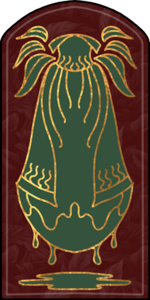
The Blücherwald Chapter is the founding chapter of the Bloodcast Order, established in the wake of the Viridian Coup by the five Knights who foiled the plot against the Empire. While initially copying the Viridian model, the Blücherwald Knights eventually abandoned the rigid structure in favor of roaming the countryside to assist anyone in need. As such, the Blücherwald Knights are seen as the model Hedge Knights among all the Bloodcast Chapters, often seen as the anchor that holds their various ideologies together. They primarily wield swords and shields while donning worn armor from their many travels, and may also utilize horses for the purposes of transportation, as fighting from them is seen as pretentious. Blücherwald Knights are one of the strongest advocates for the common citizen, and are the most vigilant in holding higher powers accountable for their actions.
| Assembly Voice |
If you are not already sitting in the 1st or 2nd Estate benches in the Assembly, you are a privileged member of the 3rd Estate benches. While you do not get a vote, you are allowed to debate with the other Assembly members as if you were a full fledged member of the Assembly. |
Basileon
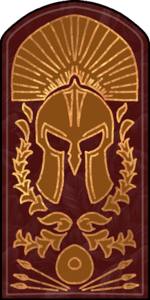
The Basileon Chapter is one of the earliest chapters to join the Bloodcast Order from its native Aetosian homeland of Etosil. The Basileon Chapter is often recognized by their traditional (corinthian) helmets, or (roman) gladiatorial helmets. The Basileon Chapter is obsessed with proving and testing military strength, it is an immensely popular Chapter with Ailor, Eronidas, and Maquixtl, who seek out glory and fierce combat in the arena to prove their mettle against other Knights, and outsiders. Basileon Chapter members are frequently also gladiators for hire who sell out their service in the ring to bring prestige and honor to Noble houses or anyone who can afford their service. Basileon Knights also frequently act as physical trainers, drill instructors, and general military practice teachers, due to their length of service. They primarily wield melee weapons though tridents are sometimes also used, as they can be found frequenting regalian coliseums.
| Greater Strength |
You are stronger than the average normal person when it comes to out-of-combat tests of strength. Whether it is in arm wrestling or other power competitions, you can always re-roll once, choosing the highest number. You can also carry much heavier loads than other normal people. |
Thousandblade
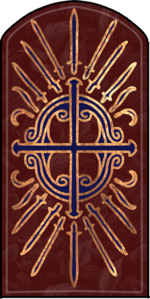
The Thousandblade Chapter is a relative latecomer to the Bloodcast Order, as it once prided itself in being isolationist in Anglia. The Thousandblade Chapterhouse can be found in Axford, Anglia, which is a monastery surrounded by a wall of rusting swords, planted into the ground for each Knight who retired to the monastery, or Kade Family Member who retreated from public life. Since recent decades, the Order has re-militarized, and recruited new members started actively protecting Temples and particularly Dragon Sites on the personal Orders of House Kade. The Thousandblade Order contains both Draconism and Unionism worshipers, who marry many of their ideological stances to preserve life, but also to protect Dragon Sites and Religious Freedom in the Empire as a memory to Dragons. Thousandblade Knights can be distantly related Cadet branch family members of House Kade, consult in Staff Ticket what this means and how to design it.
| Princely Herald |
You can write Letters of Commendation even if you are not a Noble, and your letters of Commendation have a much higher value than the average Noble or government person. Additionally you can request a personal 1 on 1 meeting with a member of the Royal Family at the Palace with a reason presented (in a Ticket). Also, you can wear armor and weapons at the Imperial Palace and Assembly, and guard for Events held there. |
Vânători
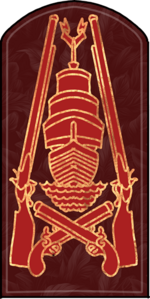
The Vânători Chapter joined up with the Bloodcast fairly early, but was always more interested in the use of ranged weapons. They were the first chapter besides the obvious Darkwald Lothar, who have widely adopted firearms training in their repetoire. The Vânători Knights primarily concern themselves with protecting the people against all manner of brigands, thieves, and pirates. They are sometimes also called Nautknights, because many of them actually fight as marine-style Knights on the decks of ships as they board pirate vessels. Vânători Knights specifically chase after thieves and burglars, seeking to return stolen property to their righteous owners (or who has paid them most). This means they sometimes get involved in fights over valuable objects or Artifacts which have a habit of quickly changing hands, deciding who the righteous owner should be and then making it happen. The Vânători Chapterhouse is in the Vlach lands in Allachia, Baldmark.
| Greased Palms |
You can make trades of resources (Divinium, Artifactsparks and Wealth Tokens) non-publicly, or can facilitate a trade between two people to make it non-public, done through a ticket rather than through public channels. |
Steelmark
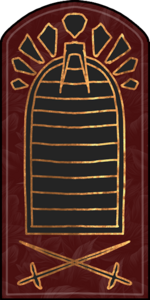
The Steelmark Chapter is a split-off from the infamous Blackmark Knights, who joined up forces with the Iron Duke of Vultaro, and essentially became a private military Mercenary Band. The Steelmark Chapter split off from that Order, refusing to work with the Iron Duke, or simply refusing to be chained down to a single liege-lord. It was induced into the Bloodcast Order fairly quickly, some also say with a modicum of threatening from their part. Steelmark Knights are brutish, large, and wear the intimidating blacksteel plate armor, while using large tower shields or other massive shields that are as big as themselves. They have a reputation of being cruel in combat and crass in a social setting, frequently the ire of Viridians as they barely hold onto the formal Internal Knight Code. Steelmark Knights act as part Knight, part Mercenary, promising to do the basic minimum of being a Bloodcast, so they get to benefit from the Solvaan Mercenary Law exception.
| Mercenary Sanction |
When it concerns Mercenary work in line with the Solvaan Mercenary Exception, you count as being Solvaan, even if you are not, meaning you cannot be persecuted for doing Mercenary work as defined in this Law. |
Forneik
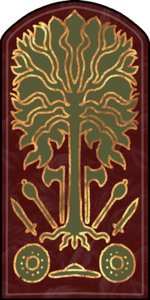
The Forneik Chapter, sometimes also called Great Oak Chapter, is a Chapter dominated by beast and monster hunters who compile a compendium of monsters, and how to best hunt them down. The Empire is filled with all manner of mutated beast, wild animals, and the Afflicted and Marken, and the Forneik Chapter brings the answer. Their Chapterhouse is based in Kerulv in Drixagh, the Regalian Archipelago, and is built inside a massive grand oak tree that is hundreds of years old. The Forneik Chapter has many Fornoss faithful or Velheim members, but also recruits outside of the Empire, even Sihndar, who bring valuable information on corrupted monsters that escape Drowda. Forneik Knights frequently fight with roundshields and axes, adopting many Skagger techniques through a lively cooperation with local Velheim clans. Forneik members tend to be more stoic and less talkative than the other Chapters, constantly on the lookout for an ambush. Notably, while Bloodcasts tend to allow Affinites, the Forneik Chapter specifically does not allow its members to have any sort of "monster" transformations, and if discovered, will expel and hunt them down for betraying the mission.
| Greater Hunter |
You are an apex hunter in the wilds, capable of a greater sense of the hunt, sight, and hearing in nature. You can effortlessly capture mundane animals in the hunt and may receive additional benefits during Monster Hunt Events or Monster encounters in the forests of Regalia. |
Slavnostní
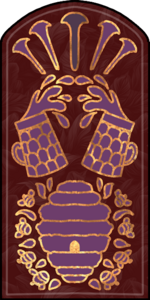
The Slavnostní Chapter is a highly unusual Chapter of Knights that both uses unusual combat techniques (Roguery and/or Technology), but also in the sense that they will try to avoid combat as much as possible. Slavnostní Knights hail from the Chapter house Poslední smích in the city of Praag. Although it was once predominantly Zeměvčel in culture, many other peoples of Aloria and cultures have joined to make the people of the Empire merrier and raise morale. That is exactly what the Slavnostní Knights do, hosting parties, getting horrendously drunk, and doing stand up comedy routines to try and ease the trauma, pain, and bad memories of the people and giving them happy days and happy thoughts. Slavnostní Knights also attempt to fight as comedically as possible, to create a spectacle even when they are forced into a fight for onlookers, and generally try to take life as simply and guilt-free as possible and facing each day with a new smile.
| Social Beast |
You have an impossibly high tolerance for Alcohol, drinking anyone under the table, and able to make cups or glasses magically refill themselves with the God's ale. You are immune to being arrested for Low Law violations, so long as what you have done isn't annoying or cringe-inducing for the Knights to deal with. Benign crime receives just a slap on the wrist and an "oh you" from Knights. |
Internal Bloodcast Code
The Internal Bloodcast Code contains additional Honor and Behavior Codes for Bloodcast Knights that are supplemental to the Common Code described on the Knights Page.
- Bloodcast Knights are expected to turn the cheek if a Noble is in trouble (unless in mortal danger), and specifically assist the common folk, especially if they are being abused by the Nobles and the Rich.
- Bloodcast Knights must seek justice for the common folk when the system and authorities fail them or stonewall them, even if this means breaking the law on occasion.
- Bloodcast Knights must reject working with Viridian Knights except for religious reasons (Temple Raids) or to fight a common threat against the Regalian Empire.
- Bloodcast Knights must hold the powers that be accountable, whether secular, religious, or in other Knight Orders, and hold an Accountability Forum to inform the people.
Bloodcast Jobs
- Accountability Forum: The Accountability Forum, is one of the levers that Bloodcast have to hold people of power accountable for their abuse of power. An Accountability Forum, is a publicly hosted Event where one or more Bloodcast take to a soap box or forum to proclaim a public debate on the abuse of power of an individual. A Bloodcast can at any point in time call an Accountability Forum by pinning a Server Event to a specific date and time. There, they are expected to make an appeal to the crowd, make their points, and hear out the crowd's supporting or refuting stances. The point is to convince the crowd to agree to a protest against the targeted individual. The targeted individual does not need to be there, but they can show up, and would be allowed to defend themselves for public review. Accountability Forums have no legal basis, they are purely mob justice through debate verdict.
- Slum Outreach: Slum Outreach is a more passive engagement of the Bloodcast, where they either seek to establish social connections with the downtrodden and forgotten, or specifically roam around Crookback and maybe even the Sewers with the intent of peacefully talking to the locals and discovering their woes and qualms with city goers. Most citizens do not report abuse of power, so the Bloodcasts believe that mingling with the places where this is most acutely felt is the best way to figure out if someone in power is actually abusing anyone.
- Public Scrutiny: Another method of holding powers to account, is Public Scrutiny, which in actually occurs more in private. Bloodcast Knights should constantly be aware of who is in government and what their expectations are. If a government official is slacking, or not fulfilling their job by expectation, Bloodcast are meant to request meetings with them to question their dedication to their position, and encourage resignation if they do not improve their work ethic and discipline, or face an Accountability Forum. Government individuals are meant to feel scrutinized by the Bloodcasts.
- Power Separation: Bloodcast, as the only Order with 0 involvement in Noble politics and 0 Noble influence in their work, must continually be aware of Noble encroachment on the other Knight Orders. They are expected to pay exceptionally close attention to Nobles who are members of Knight Orders, and how that membership influences the attempt of their family to influence Order politics, or vice versa. Bloodcast Knights believe in true separation, and if a Noble House is found guilty of trying to steer a Knightly Order into their political benefit or starts corrupting their Order Code, Bloodcast are expected to sound all alarm bells very publicly.
- Protest Guard: The right to protest in Regalia is not a civil right, meaning that protestors usually get arrested. One exception is a protest which is guided by Bloodcast Knights, in which the Knights stand responsible for the good conduct of the Protest. A Protest involves a group of people standing strategically in a specific location like the front door of a Noble Estate, in front of the Golden Willow, or blocking the entryway of the All Beacon Temple or some other building where-in a person they are protesting resides. The Knights must ensure that the protest does not turn violent and that slogans and speeches are acceptable within the norms of the Court and Emperor's respect. Finally, they must also protect the protest from any counter-protest violence. Protests are encouraged to be pinned as server Events.
History
Bloodcast Order history is surprisingly simple, and concise. The order officially started in 122 AC, during the Viridian Coup Attempt. Five Viridian Knights defied the other Viridian Knights who intended to imprison Emperor Henri III and usurp the throne, by riding to the Emperor and warning him. On their way to the castle, the five Knights were attacked by their fellow brothers in arms, but were victorious and rode on to the Palace to warn the Emperor, which would eventually lead to the rounding up and execution of the Viridian Knights who plotted treason. The five Knights, after having been attacked and riding to the Emperor, rode with their usual green capes covered in blood, hence becoming red. They then swore an oath to do better than what the Viridians had, and Emperor Henri III gave them the rights to found a new Knighthood Chapter, ostensibly to compete with the Viridians who were already severely reduced in power, but also to cover the blind spots the Viridians could not in society. Those five ex-Viridians thus founded the Bloodcast Order, became its first teachers and Elder Council, and lead the order until the last of them, Councilmaster Henry of Benteford, died in 167 AC. The Order's history has otherwise been somewhat unremarkable. They have been present in every single war and conflict Regalia has been in, though always less visible than the Viridians who seize the moment and the limelight. They have been involved in many of the greatest arrests in Regalian law enforcement, but always bow out at the end so as to avoid being involved in the regime's repression efforts on those who were guilty by association. Many Bloodcast Knights go about their lives remaining largely unknown to the people, wandering the roads in the countryside to offer help and support to areas and peoples that the Viridians are too good for and the Aelrrigans too busy for.
Trivia
- The Bloodcast Order is particularly rough on people who violate the boundary against Nobility and Viridians.
| ||||||||||||||||||
| Accreditation | |||||||||
|---|---|---|---|---|---|---|---|---|---|
|
| ||||||||